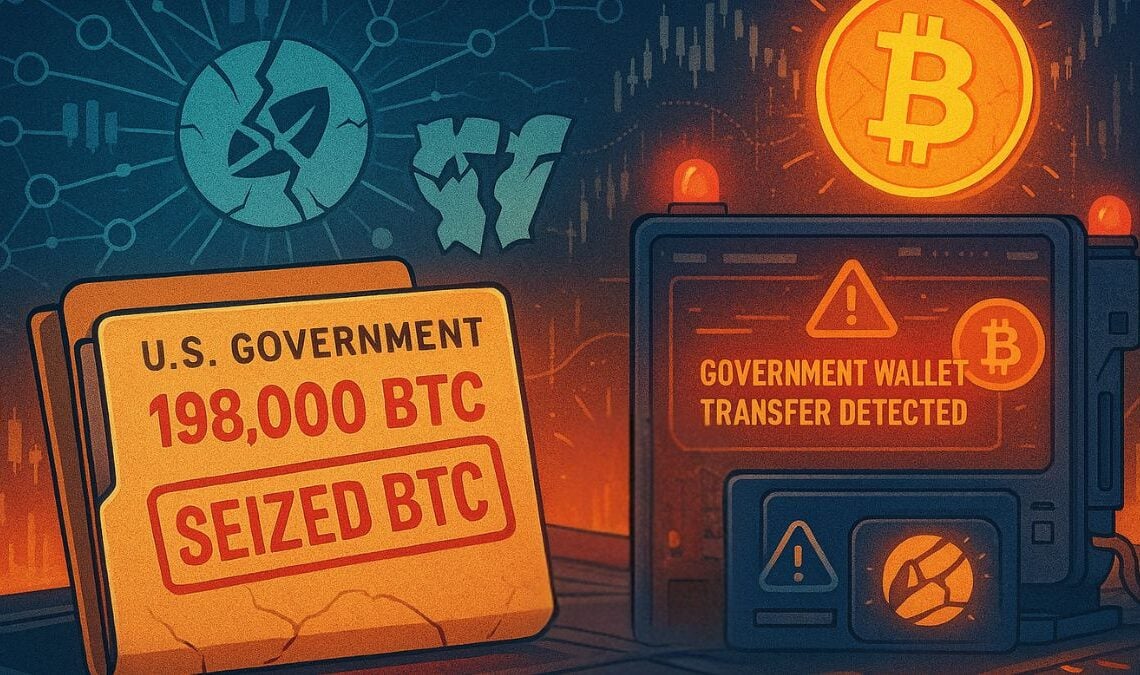For months, the massive trove of Bitcoin linked to the Bitfinex hack had remained untouched — until now. A recent transfer from a wallet associated with the U.S. government has reignited speculation across the crypto community, prompting questions about whether a major liquidation could be underway. With nearly $24 billion in crypto under U.S. custody, even a small movement can send shockwaves through the market. As traders brace for potential impact, this latest development sheds new light on how government-held crypto assets could influence Bitcoin’s price trajectory.
Table of Contents
ToggleU.S. Government Wallets Confirm New Movement
The alert came when Arkham Intelligence detected recent outflows from a wallet labeled as belonging to the U.S. government — a wallet that holds some of the Bitcoin seized from the infamous Bitfinex hack.
Source: Arkam
At the time of writing, the wallet holds approximately 198,000 BTC, valued at over $23.5 billion, making the U.S. one of the largest single holders of Bitcoin. Importantly, none of the seized BTC had moved in four months — until this week, when several transactions caught analysts’ attention.
A Strategic Misstep or Controlled Reallocation?
The sudden activity sparked confusion online. U.S. Senator Cynthia Lummis expressed alarm last week at reports suggesting the government had sold off over 80% of its Bitcoin reserves — a claim that was quickly challenged by on-chain analysts.
DID THE US GOVERNMENT JUST SELL 170,000 BTC ($20 BILLION)?
— Arkham (@arkham) July 23, 2025
No. This Freedom of Information Request response from the US Marshals Service (USMS) cites them as holding 28,988 BTC ($3.4B), but other departments of the US Government also seize and hold Bitcoin, including the FBI,… https://t.co/8kpjwyKcT9 pic.twitter.com/uB7EejUCVz
Arkham clarified that while the U.S. Marshals Service holds around 29,000 BTC, the government as a whole retains control of over 198,000 BTC spread across multiple agencies.
I’m alarmed by reports that the U.S. has sold off over 80% of its Bitcoin reserves—leaving just ~29,000 coins.
— Senator Cynthia Lummis (@SenLummis) July 16, 2025
If true, this is a total strategic blunder and sets the United States back years in the bitcoin race. https://t.co/ciYf1uhy0x
These conflicting narratives highlight the growing pressure on governments to clarify how they manage digital assets, especially in an environment where on-chain transparency allows anyone to track wallet movements in real time.
The Origins of the Bitfinex Hack Funds
The bitfinex hack, which occurred in 2016, remains one of the largest crypto heists in history. Hackers stole over 119,000 BTC, which the U.S. government later recovered in operations tied to multiple investigations — including arrests and asset seizures involving the infamous duo Ilya Lichtenstein and Heather Morgan.
According to blockchain intelligence sources, here’s a breakdown of where the government’s current BTC reserves originate:
$13.65B of US Government BTC was seized from the Bitfinex Hackers. $8.26B of US Government BTC was seized from ‘Individual X’ in the Silk Road case (understood to be someone who had hacked Silk Road) in 2020. $1.17B of US Government BTC was seized from James Zhong, the Silk Road…
— Wu Blockchain (@WuBlockchain) July 24, 2025
- $13.65B seized from the Bitfinex Hack
- $8.26B from ‘Individual X’ (Silk Road case)
- $1.17B from James Zhong (another Silk Road hack case)
These funds are held across different wallet clusters managed by entities such as the FBI, DOJ, and U.S. Marshals Service.
Market Implications and Investor Reactions
Despite the transfers, no BTC from the Bitfinex hack wallets appears to have been sent to exchanges — a key signal that might indicate intent to sell. Instead, analysts speculate the movement could be part of internal rebalancing or custodial restructuring.
That said, market participants remain on edge. With Bitcoin trading above $118,000, even small outflows from a government wallet can cause price volatility or trigger panic among retail investors.
Final Thoughts: What the Bitfinex Hack Means for Bitcoin in 2025
The renewed activity surrounding the bitfinex hack funds is more than just a technical detail. It reflects the broader intersection of crypto, regulation, and state-level control of digital assets. As the U.S. government continues to manage an enormous Bitcoin portfolio, every transaction — no matter how small — will be watched with scrutiny.
While the crypto community may speculate on future sales or policy changes, one thing is clear: government wallets have become one of the most important whales in the market. And their moves can shift sentiment, liquidity, and momentum overnight.










